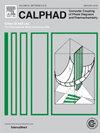钕硒二元体系相平衡和热力学评估的再研究
IF 1.9
3区 材料科学
Q4 CHEMISTRY, PHYSICAL
Calphad-computer Coupling of Phase Diagrams and Thermochemistry
Pub Date : 2024-10-24
DOI:10.1016/j.calphad.2024.102757
引用次数: 0
摘要
利用 X 射线衍射 (XRD)、配备能量色散光谱仪的扫描电子显微镜 (SEM-EDS) 和差示扫描量热 (DSC) 研究了 20-80 at.% Sn 范围内的钕锡相图。除了九种已知化合物 Nd5Sn3、Nd5Sn4、Nd11Sn10、NdSn、Nd3Sn5、NdSn2、Nd3Sn7、Nd2Sn5 和 NdSn3 外,还检测到两种已报道的化合物 Nd3Sn 和 Nd2Sn3 以及两种新化合物 Nd2Sn 和 Nd4Sn5。Nd2Sn、Nd4Sn5 和 Nd2Sn3 的形成过程已确定如下:Nd2Sn 是在 1134 °C 时通过包晶反应 Nd3Sn + Nd5Sn3 → Nd2Sn 形成的;Nd4Sn5 和 Nd2Sn3 分别是在 1168 °C 和 1146 °C 时通过包晶反应形成的。Nd3Sn 和 Nd3Sn5 只在高温下稳定,Nd3Sn 在 1163 ℃ 时通过包晶反应形成,在 1114 ℃ 时分解;Nd3Sn5 在 1153 ℃ 时通过包晶反应形成,在 1136 ℃ 时分解。此外,还更新了五个不变的反应温度。掺杂了新实验数据和所有其他可用实验信息的 Nd-Sn 系统采用 Calphad 方法进行建模。对钕锑体系进行了全面的热力学描述,并对计算数据和实验数据进行了广泛的比较,结果表明几乎所有采用的实验数据和理论数据都能令人满意地匹配。本文章由计算机程序翻译,如有差异,请以英文原文为准。
Re-investigation the phase equilibria and thermodynamic assessment of the Nd-Sn binary system
The Nd-Sn phase diagram has been investigated within the range of 20–80 at.% Sn using X-ray diffraction (XRD), scanning electron microscope equipped with energy dispersive spectrometer (SEM-EDS), and differential scanning calorimetric (DSC). In addition to the nine known compounds, Nd5Sn3, Nd5Sn4, Nd11Sn10, NdSn, Nd3Sn5, NdSn2, Nd3Sn7, Nd2Sn5 and NdSn3, two reported compounds, Nd3Sn and Nd2Sn3, as well as two new compounds Nd2Sn and Nd4Sn5, have been detected. The formation of Nd2Sn, Nd4Sn5 and Nd2Sn3 has been determined as follows: Nd2Sn forms by peritectoid reaction Nd3Sn + Nd5Sn3 → Nd2Sn at 1134 °C; Nd4Sn5 and Nd2Sn3 form by peritectic reaction at 1168 °C and 1146 °C, respectively. Nd3Sn and Nd3Sn5 are only stable at high temperatures, Nd3Sn forms by a peritectic reaction at 1163 °C and decomposes at 1114 °C, and Nd3Sn5 is formed via a peritectic reaction at 1153 °C and decomposes at 1136 °C. Additionally, five invariant reaction temperature have been updated. The Nd-Sn system was modeled using the Calphad approach, incorporating new experimental data along with all other available experimental information. A comprehensive thermodynamic description of the Nd-Sn system has been obtained, and extensive comparisons between calculated and experimental data indicating that almost all adopted experimental and theoretical data are satisfactorily matched.
求助全文
通过发布文献求助,成功后即可免费获取论文全文。
去求助
来源期刊
CiteScore
4.00
自引率
16.70%
发文量
94
审稿时长
2.5 months
期刊介绍:
The design of industrial processes requires reliable thermodynamic data. CALPHAD (Computer Coupling of Phase Diagrams and Thermochemistry) aims to promote computational thermodynamics through development of models to represent thermodynamic properties for various phases which permit prediction of properties of multicomponent systems from those of binary and ternary subsystems, critical assessment of data and their incorporation into self-consistent databases, development of software to optimize and derive thermodynamic parameters and the development and use of databanks for calculations to improve understanding of various industrial and technological processes. This work is disseminated through the CALPHAD journal and its annual conference.

 求助内容:
求助内容: 应助结果提醒方式:
应助结果提醒方式:


